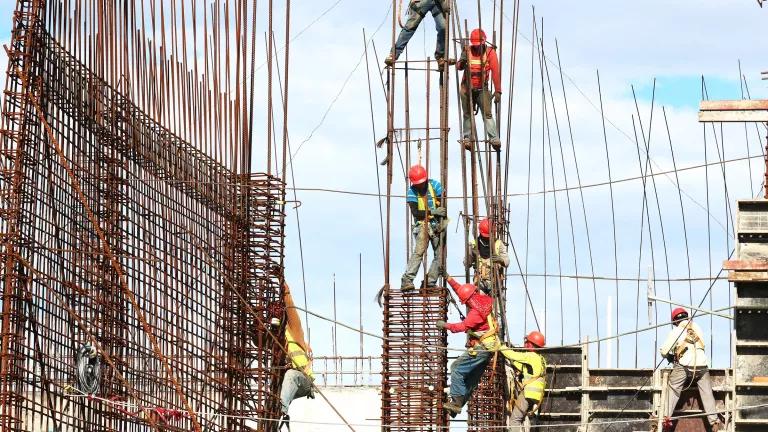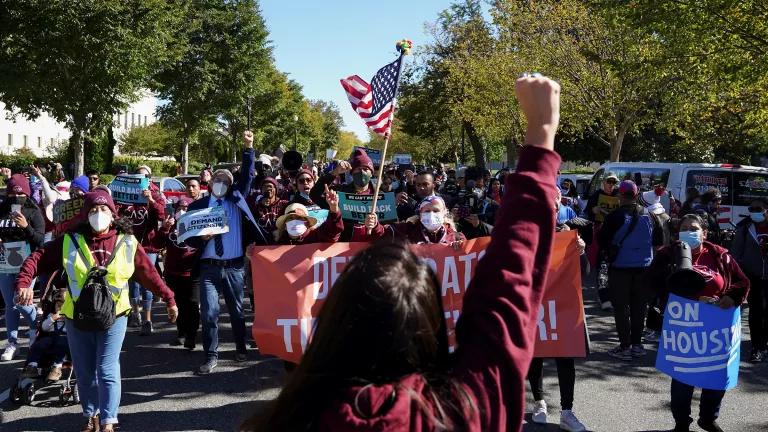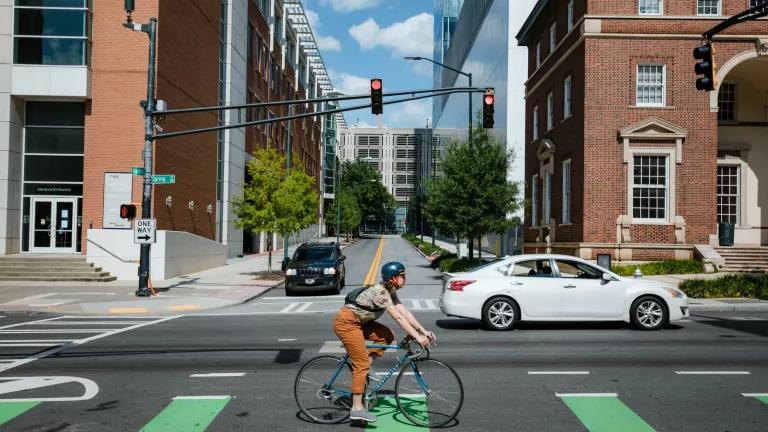Cities Rev Up Transition to EVs with Car Sharing Programs

It’s no secret that transportation is the largest source of carbon emissions in the United States. So it’s not surprising that, besides promoting the use of public transit, biking, and walking, cities are also embracing electric vehicles (EVs) in their quest to cut carbon emissions. But some are thinking outside of the box: In addition to electrifying municipal fleets, many of the cities participating in the Bloomberg Philanthropies American Cities Climate Challenge are also engaging with community and industry partners to support electrified options that don’t require owning your own EV, such as car sharing which has been demonstrated to reduce car ownership amongst users. This reflects both a desire from cities to more aggressively reduce carbon pollution and a desire from residents for more varied, affordable, and sustainable transportation options. Additionally, several of these cities are striving to center equity in the design and delivery of these programs, seeking to ensure that their benefits are available to communities traditionally most impacted by transportation pollution.
Boston
Boston recently announced the launch of Good2Go, an electric vehicle (EV) car-share program with sliding scale rates that was conceived to support affordable access to clean transportation options in the Roxbury neighborhood, which has been the heart of Boston’s Black community for decades and has faced disproportionate environmental burdens. The program, funded with a grant from the Massachusetts Clean Energy Center (MassCEC), is a collaboration between the city of Boston; the local nonprofit E4TheFuture, which is leading the program; the city’s utility, Eversource; the Metropolitan Area Planning Council; Mobility Development; Nuestra Comunidad; and Shared Mobility. The service will be based initially at Roxbury Community College and Bartlett Station in Nubian Square with the primary intention of serving local residents and businesses, though it will be accessible to all. Similarly, individuals of any income will be able to use the service, but those with lower incomes will pay a lower rate. By providing access to clean energy passenger vehicles, participants will not only become more familiar with operating an EV but they will also be able to make a comfortable, safe, and environmentally friendly transportation choice. As membership in the program grows, additional vehicles and locations will be added.
The expansion of EV car sharing is included in the city’s Climate Action Plan and Zero-Emission Vehicle (ZEV) Roadmap, both of which outline a multifaceted strategy for citywide ZEV deployment. The city’s goal is for 100 percent of residents to be within a 10-minute walk of an EV car-share facility or a public EV charger.
Denver
In August 2020, Denver pledged $300,000 of its COVID relief funds toward supporting the expansion of an electrified car-share service to underserved communities and essential workers. This includes subsidizing memberships for at least 450 residents to the nonprofit Colorado CarShare, which provides low-cost car sharing for underserved residents and small businesses that can’t afford to own cars. The relief funds went towards purchasing seven new EVs and charging stations in low-income, under-resourced communities. This aligns with both Colorado’s Electric Vehicle Plan 2020 to put nearly a million (940,000) EVs on roads by 2030 and Denver’s Electric Vehicle Action Plan, which sets a goal of electrifying 100 percent of light-duty vehicles by 2050, with electrifying car-share programs as a key strategy. And in December, the Colorado Public Utilities Commission approved a $5 million pilot project offering rebates for lower-income residents to buy new or used EVs, as part of a larger $110 million investment in EV infrastructure with Xcel Energy.
Los Angeles
Los Angeles began partnering with BlueLA in 2018 to pilot EV car sharing in low-income communities. This was made possible by a $1.7 million grant from the California Air Resources Board, through California Climate Investments, a statewide program that allocates billions of cap-and-trade dollars toward reducing greenhouse gas emissions, strengthening the economy, and improving public health, particularly in disadvantaged communities. BlueLA currently offers 100 electric vehicles and 200 chargers serving the Boyle Heights, Chinatown, Downtown, Echo Park, Koreatown, Pico-Union, and Westlake neighborhoods. While standard membership costs $60 per year with driving priced at 20 cents per minute, the program also includes an income-qualified membership rate of $12 per year at 15 cents per minute. Note that during the pandemic, BlueLA is offering limited service called the COVID-19 Essential Trip Program.
Minneapolis and St. Paul, Minnesota
The Twin Cities are partnering with HOURCAR, Xcel Energy, and East Metro Strong to launch the Twin Cities Electric Vehicle Mobility Network, a new EV car sharing and public charging network with accessible locations and pricing structures—all powered by renewable energy. The car-share component uses a “one-way, semi-free-floating model,” where drivers can pick up and drop off cars anywhere within a roughly 35-square-mile service area, though they will be incentivized to bring cars back to charge at hubs when needed. The cities partnered with HOURCAR to engage community members regarding barriers to access and pricing structures. Charging hub locations were selected based on a variety of demographic, technical, and logistical factors. The project website includes details about the site selection and community engagement processes as well as a survey in multiple languages for residents to share their ideas.
St. Louis
St. Louis and its partners were awarded funds for the St. Louis Vehicle Electrification Rides for Seniors (SiLVERS) project in summer 2020, and are working toward a launch in summer 2021. The program will start with a fleet of five light-duty EVs and supporting EV charging infrastructure that will be operated by social service agencies in low-income communities in St. Louis that have limited experience with or access to clean vehicle technologies. Funded by the U.S. Department of Energy’s Office of Energy Efficiency and Renewable Energy to invest in advanced, innovative vehicle technologies, SiLVERS has widespread support from multiple partners: The three-year project will be implemented by Forth, along with the St. Louis Area Agency on Aging, City Seniors Inc., Northside Youth and Senior Service Center, St. Louis Regional Clean Cities, and others, to introduce EVs and develop community awareness and adoption. While not a traditional car-share service, the program is a shared electric transportation option that electrifies transportation services currently run by social service agencies assisting low-income seniors with medical appointments and meal deliveries. The goals of the program include bringing the air quality and health benefits of EVs to underserved communities, demonstrating the potential for lowering social service agency costs through adoption of EVs, expanding charging access to nearby communities, and increasing access to existing senior transportation services.
Many of these cities’ programs have an explicit focus on equity, acknowledging that high sticker prices have long posed a fundamental barrier to widespread EV adoption. The programs also address the fact that even interested drivers often encounter a chicken-or-egg dilemma: Few institutions are willing to invest in charging infrastructure in neighborhoods where people aren’t already driving electric—but people can’t drive electric if they can’t charge in their neighborhoods. Fortunately, cities are beginning to recognize and address these issues. And while more work needs to be done to achieve universal EV access, the innovative ideas put forth by these six Climate Challenge cities help illuminate a path forward.


